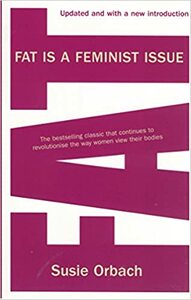Take a photo of a barcode or cover
As a fat liberation activist, I am sorry this is just fatphobic nonsense. It's still utterly focused on fixing fat people because they are apparently overeaters.
challenging
inspiring
slow-paced
challenging
emotional
informative
reflective
slow-paced
I went in to this book with an entirely different idea to what it was about, like many people who have written reviews here. The title eludes to a fascinating prose on views of fat through a gender/social lends. Instead the title is only a vague tie-in to what the book is actually about: compulsive eating self-help groups.
Fat does not equal compulsive eating.
Just because you have a BMI above 25 (medical definition of overweight at present) doesn’t not mean that it is caused by overeating. That can play a part, but factors like biological makeup (only briefly touched here and dismissed) and food poverty (which is a major problem especially in children obesity and is not even mentioned) also contribute.
Compulsive eating does not equal fat.
You can have a compulsive eating disorder but manage to keep your weight at a society accepted level. Reasons for this could be the severity of the compulsive eating or binging, intense exercise and self-induced vomiting - which leads to the serious eating disorder Bulimia Nervosa.
The books sample of women is also very restrictive. It’s not mentioned but it very much gives the feels of white American middle class women. These are not the only women to have compulsive eating problems, AND eating disorders in men are often missed and misdiagnosed and you could probably write a whole separate chapter on how women=weak=excused for having an eating disorder, men=strong=no possible way to have an eating disorder.
I also didn’t like the chapter on medical views. Not only are the references to obesity research outdated, but it only painted the picture of the dominate judging male doctor who only tells you to diet or to take the latest wonder pile. Maybe that is acurate in America, but in the UK doctors are TRAINED to try to be as un-judgemental as possible (they’re only human).
I’ll finish on a nice note about what I actually liked: the discussion into compulsive eating as a coping mechanism for an array of issues (depends on the individual) and exercises/talking points about how to create new coping mechanisms that don’t focus on food. (Taking away someone’s coping mechanism, however self-harmful it is, is not good).
Fat does not equal compulsive eating.
Just because you have a BMI above 25 (medical definition of overweight at present) doesn’t not mean that it is caused by overeating. That can play a part, but factors like biological makeup (only briefly touched here and dismissed) and food poverty (which is a major problem especially in children obesity and is not even mentioned) also contribute.
Compulsive eating does not equal fat.
You can have a compulsive eating disorder but manage to keep your weight at a society accepted level. Reasons for this could be the severity of the compulsive eating or binging, intense exercise and self-induced vomiting - which leads to the serious eating disorder Bulimia Nervosa.
The books sample of women is also very restrictive. It’s not mentioned but it very much gives the feels of white American middle class women. These are not the only women to have compulsive eating problems, AND eating disorders in men are often missed and misdiagnosed and you could probably write a whole separate chapter on how women=weak=excused for having an eating disorder, men=strong=no possible way to have an eating disorder.
I also didn’t like the chapter on medical views. Not only are the references to obesity research outdated, but it only painted the picture of the dominate judging male doctor who only tells you to diet or to take the latest wonder pile. Maybe that is acurate in America, but in the UK doctors are TRAINED to try to be as un-judgemental as possible (they’re only human).
I’ll finish on a nice note about what I actually liked: the discussion into compulsive eating as a coping mechanism for an array of issues (depends on the individual) and exercises/talking points about how to create new coping mechanisms that don’t focus on food. (Taking away someone’s coping mechanism, however self-harmful it is, is not good).
This is a hard book to rate because it's so specific to opening a support group and i have no interest in that. I did enjoy the analytical aspect of the first half of the book but yeah..i was definitely the wrong audience for a lot of it
Although it insists on not being a diet book, the aim of this book seems to just be to help women lose weight. Some good points were made about psychology of fatness and how it can be used for different things, but it is very much just written to convince you that if you just deal with your psychological issues you will magically become thin! At one point it suggests that you “reach your ideal weight to explore the meanings behind it” - so I AM supposed to diet to try reach a goal weight, just so I can see how it feels?? Then if I gain weight that is because of some psychological reason rather than that diets just don’t work, as is written earlier in the book? It started off good and then I am afraid it turned rather problematic. Would have preferred to read a more academic analysis of fat and feminism - the latter of which is actually not discussed that much. I was disappointed with this book.
I wanted to like this book because it's often cited as a seminal text for body image issues, but while certain sections are spot on regarding women's self worth and body acceptance in misogynist society, the central premise is flawed.
The central premise states that "fat is a social disease" and if the word disease doesn't ring alarm bells, well. It takes for granted that inside every fat woman is a thin woman screaming to get out; that to be a well-adjusted woman who has dealt with her psychic demons is to be a thin woman. It acknowledges that fatphobia is tied to patriarchy and culture, but also reaffirms the message that it's justified because the focus is on losing the fat.
There's a lot to think about here but central to the book's flawed logic is that it doesn't unpack how fat is political. Socioeconomic factors are ignored in favour of only psychological issues. Some sections might help women dealing with overeating, but otherwise I think this book can be a trigger for many people and thus is quite dangerous in that it reinforces the fatphobia it otherwise seems to critique as a symptom of a misogynist society. In a word, bizarre.
The central premise states that "fat is a social disease" and if the word disease doesn't ring alarm bells, well. It takes for granted that inside every fat woman is a thin woman screaming to get out; that to be a well-adjusted woman who has dealt with her psychic demons is to be a thin woman. It acknowledges that fatphobia is tied to patriarchy and culture, but also reaffirms the message that it's justified because the focus is on losing the fat.
There's a lot to think about here but central to the book's flawed logic is that it doesn't unpack how fat is political. Socioeconomic factors are ignored in favour of only psychological issues. Some sections might help women dealing with overeating, but otherwise I think this book can be a trigger for many people and thus is quite dangerous in that it reinforces the fatphobia it otherwise seems to critique as a symptom of a misogynist society. In a word, bizarre.
informative
reflective
medium-paced
informative
slow-paced






